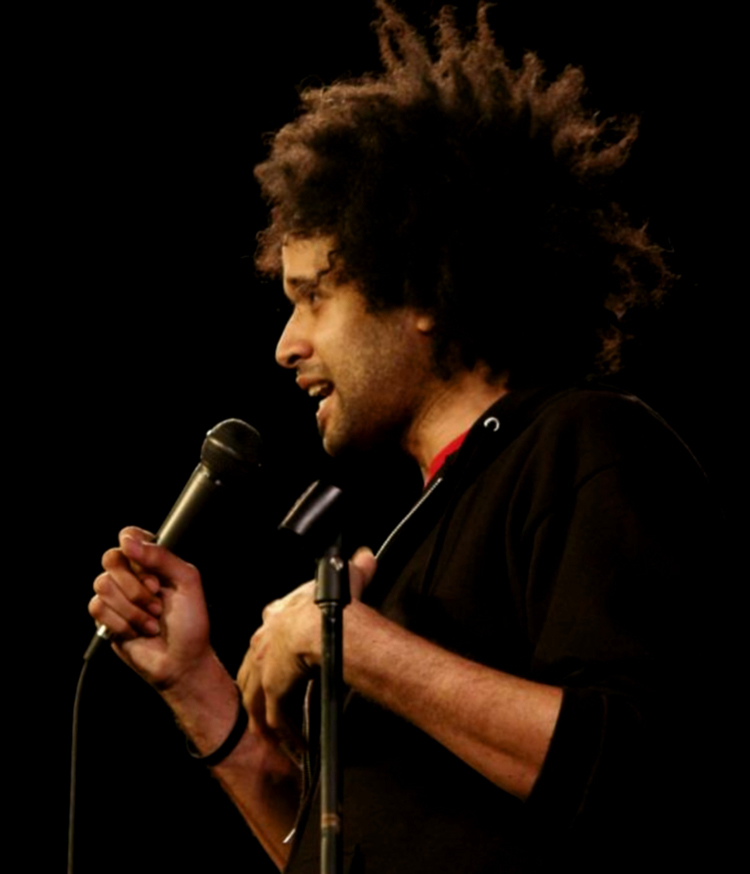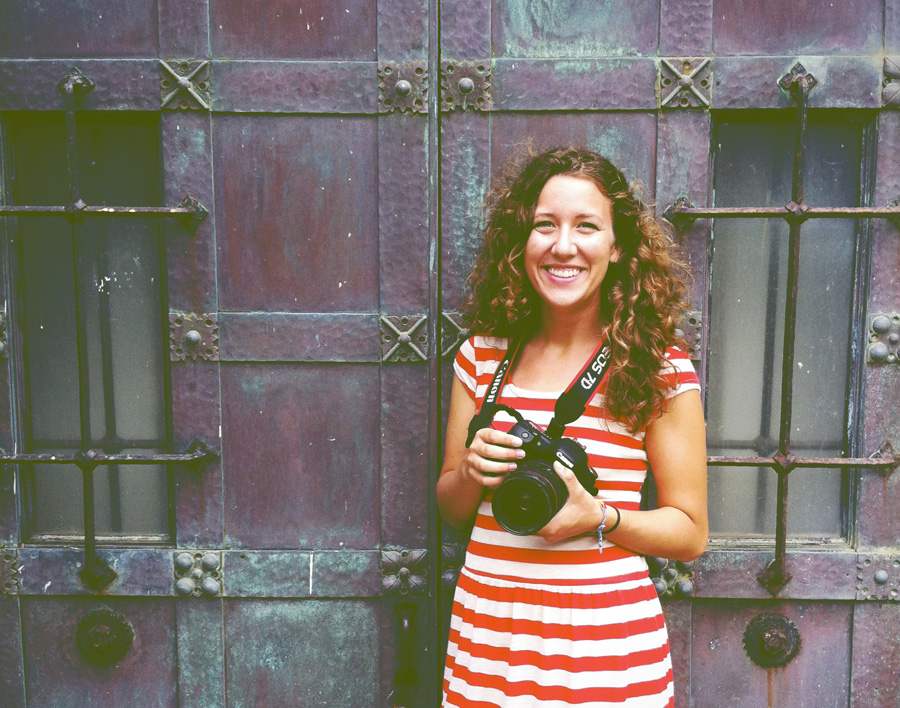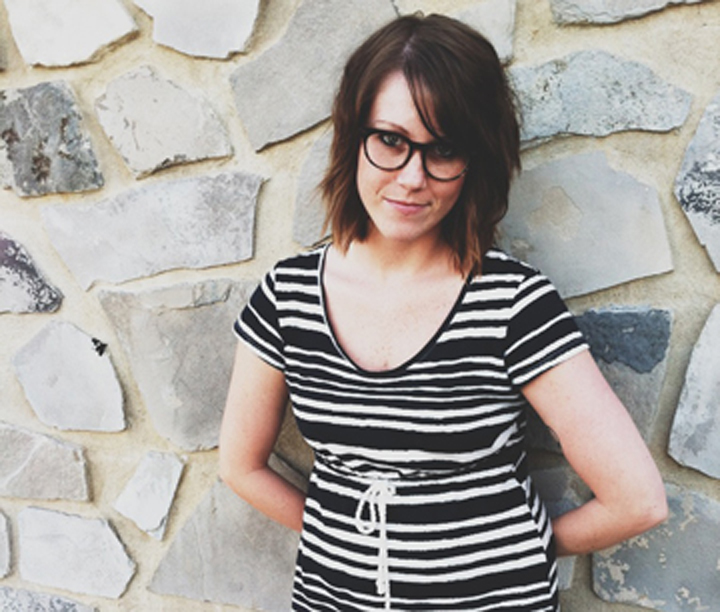A few words with Sherman Edwards

By Marty Shutter
Contributing Editor
A young actor with no resume once told me from across the table, “I’m ambitious.”
“I believe you.”
“No really, I’m ambitious. I’m going to New York when I graduate. I’ve already taken a class there, last summer.”
“That’s good.”
“You’ll see.”
“Ambition, you’ll have to show me, maybe you will.”
Wednesdays a while back, another actor, improvisor and friend Sherman and I would meet up around midnight at my place off Belmont and Racine in Chicago. We’d drink a few beers and walk over to a loft on dead-quiet Lincoln above that rug shop. The walk was short, or we’d meet and lock our bikes. The door was unmarked and always open. Mail for someone was ever on the wood floor and there wasn’t much else but a white hallway leading back to some stairs. Each floor in this building equals to three floors of the layperson’s home. Each loft is as deep as a quarter-city block.
By the first turn of the stairs we hear music, muffled voices, some sort of ringleader, laughter and stragglers on the stairs, drunk and looking up for who’s next. Hunch under curtains through an open door into dark, and past too many organs for any normal band and between two thick, black hanging velvet curtains into a warmly lit saloon of smoke, tables, lamps a majestic bar along the wall, people standing, sitting, everywhere crowded and smoking up next to walls and the bar. Notebooks in every back pocket, out on tables, pens, pencils scratching out thoughts, some kid pacing in the hall because he drank too much to perform but he’s too drunk to know the difference, so he weaves head down towards the stage, through the wolves hungry from the earlier, sanitized Chicago open mics. They’re done now testing, they are here now to drink cheaply and brand each other by their own fire. This is a stand up comic’s speakeasy and here they become the hecklers. The crowd of comics yells, issues threats, stumps delivery, falls over couches, starts fights.
Occasionally an unsuspecting girl wanders in, she is encircled by eyes. The suspecting women are onstage, testing armor. So much smoke.
We each get a dollar beer and sit at one of the tables. The owner of this loft has taken the insides of three or four dead restaurants and bolted their furniture to his floor. The bar is spectacular and runs down the length of the room and at the end, the host, a tall former football player brings up the music and flashes the red light on the newcomer. Nobody heard the newcomer, and he was cut in the middle of the joke, and his face twists drunk and awkward. The host stomps onto the stage, takes the mic, verbally assaults the newcomer, fails at a handful of jokes, then announces the next to try.
Sherman Edwards is tall. He thinks like a knife cuts and charms the charmer. He is so funny the Chicago Reader just called him the Funniest Stand-up in Chicago. I didn’t know that when I called him from my Grandpa’s pool in San Diego to talk about storytelling and Batman. When he answers the call, he’s walking around Logan Square in Chicago on a warm summer night. He’s just finished a writing session for his two man sketch show with Kevin Miller, the other man in Tomato Tomatoe.
Let’s describe your interpretation of stand up to someone new to humanity, like if they asked what humans use stand up for.
It’s a great way to communicate, kind of get problems out in a light way. Prime example, I think it was in the eighties, in stand up in comedy, stand up comedy world, it was a huge issue apparently about how men couldn’t find the clit. We could never find the clitoris, but now I don’t hear any stand up about it, and I don’t hear anyone really talking about it, or complaining about it, I think guys pretty much know where it is now. I think stand up had a big part in that.
Go further.
Me personally, I do a lot of racial stuff, and it’s kind of observational, but if I’m going to use it , I don’t want it to just be that, so I’ll tell a story about how if someone is innocently being racist, but to other people, you come off like a jerk. And it is weird for the audience. The crowds I play for are majority white, so it can get that little bit of white guilt, but they can still laugh at it and realize oh yeah, I’ve actually done that.
That’s a scientific approach.
Sure I could say that. I do kind of look at it scientifically sometimes, I used to be an engineering major.
What part of your artistry is piqued by stand-up? You certainly wouldn’t let me simply call you a stand-up.
I’m a big fan of the silence between words. You can be a good actor while telling stand up.
Let’s think about this, where the hell does that fit in evolutionarily? How did that evolve, the want to express ideas?
Well the storyteller is one of the oldest jobs ever. Just passing that on. And there is no kind of modern day storytellers, but I guess for the most part your storyteller is going to be some kind of musician, or a poet, or a stand up, like those are your storytellers now, and you got your actors, and directors and writers, they’re all storytellers. But standing up there, one person telling a story, I don’t know, something about it it is always interesting, it’s entertaining 1000’s of years ago, it’s going to be entertaining 1000’s of years from now. That’s one person being able to tell a good story in front of a couple of people.
How do you think the story came about?
I mean the first stories were observations. The first story ever told was from an observational comic. There was someone who was like, Oh I saw a bird. And he ate my kids. And he’d told a story.
I feel like it was an initial part of our survival. It’s what brought us together and allowed us to learn how to better thrive.
Oh, words and communication is what always brings us together; it’s why we as people are more together now, cause there’s more access to communication. Like how you’re talking to me through a laptop.
What is our story now then? If during the day we walked over to another tribe… what’s our story now? What’s the History Channel documentary from 2000 years in the future about us now say. What will the future say we valued?
I always think about, there’s a street in Virginia, in Richmond called Monument Avenue, and when you walk down it you just see all of these statues of great people throughout time, and when you first start it’s all military leaders on horses and when you get to the last one the only representative from our century is Arthur Ashe, standing there with a tennis racket.
What does that arise in you?
Doesn’t affect me really in any way, but I want to be aware of it so I can comment on it. I mean Brad Pitt will live on forever, Gaddafi will be forgotten.
Do you use the question, ‘what do you do?’ Is that a question that you use on people?
I do sometimes, it depends on how much they’re talking to me, then I’ll be like what do you do, what is your Bruce Wayne? When I had a day job working in media sales, my Bruce Wayne was media sales, my Batman is the performing, as an actor, as stand up.
Bruce Wayne and Batman. Describe the difference in the types of exhaustion produced in each job.
Here’s the thing. That’s the difference between a Batman and a Bruce Wayne. Batman, that’s what you do, so when you get back you might even be more excited then when you first went away. When you come home from Bruce Wayne, you’re probably gonna be exhausted, you don’t really wanna be Bruce Wayne, you wanna be Batman, that’s what you were born to do, so sometimes you might come back from doing the Batman stuff and you’re more hyped up then before you put on the cape.
Right on! The satisfied exhaustion from working with your proper faculties.
I’ve had…I’ve had pink eye, strep throat, shingles, all of them, and when I go onstage, I don’t feel pain.
Let’s assume whether or not they act on it, does everyone have a Batman and a Bruce Wayne?
I don’t think everyone necessarily has a Bruce Wayne, but everyone has a Batman. Some people might get to be their Batman. I’m getting closer to being just Batman everyday. I’m slowly.. Bruce Wayne is almost completely all gone. Hopefully, I’ll be all Batman.
What the hell happened to that communal dinner where we told our stories? Where everyone that came to the table had a role during the day, the storyteller to warn us about that kid-eating bird, the hunters who monitor the flock, medicine men with the latest herbal essence etc? Each using his natural born talents for the betterment and survival of us all? What’s up with so many of us having to be Bruce Waynes these days?
There’s a demand for everything. And there’s more of a demand for Bruce Waynes than there are Batmans.
Yikes. Daunting.
Yup.
I miss you man, wish I was cooking for a big party right now and we were watching the weirdos stumble out of my living room.
That’d be great.
***
You take those dollar beers up to the roof for the best view. The noise below goes on but up here you can see Chicago in her midnight shine. There’s the lake, Wrigley in the dark, St. Alphonsus. Downtown stretches up and beams to you. You stand at the edge of the building, as the bottom of the skyline and plan with allies your jokes and defenses, dredging notebooks for gold you hope shines on stage.
Obviously that loft racket is over. No way Chicago will allow an unsanctioned midnight raucous such as that. There was nothing there anyway but one more outlet for Bruce Waynes to fireproof their capes. Nobody got their routine out very well, the crowd was too drunk and self involved and beautiful and smoke filled, and it was too late and the host was often an ass and there was always a fight and you never knew when it’d be your turn take that fight or go on stage and you’d probably get pissed on from seven floors up if you hung around that outside door too long anyways. We all came back though, because we were all Bruce Waynes looking for our Batman in the middle of the night.





Comments